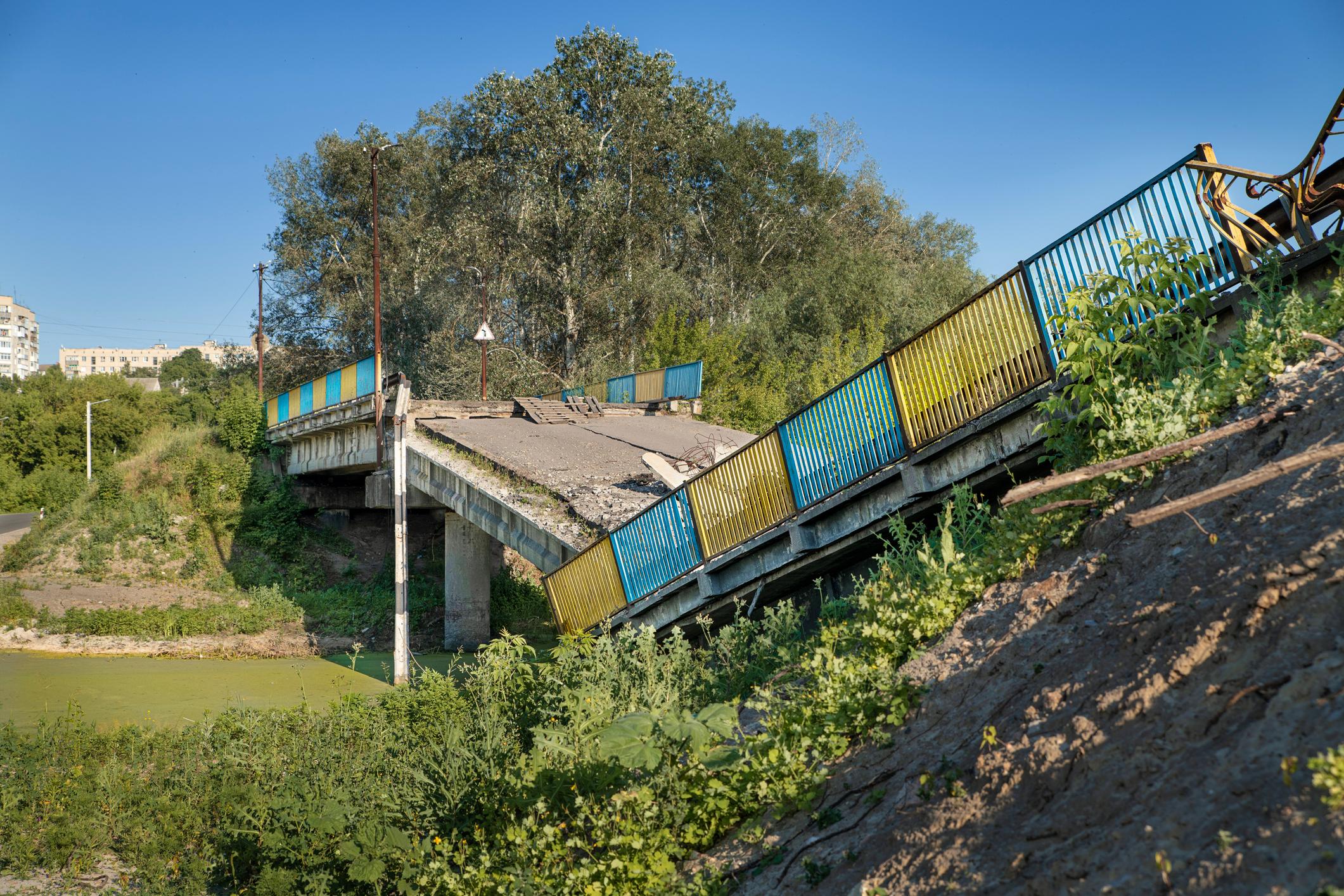Anti-corruption capacity in Ukraine’s local self-government
Ukraine’s future peace must include efficient and fair recovery for all its citizens. The Russian invasion caused significant damage in the housing, energy and social sectors, and most reconstruction and recovery efforts will be in local communities (hromadas). Local self-government authorities (LSGs) will play a central role.
Ukraine’s recovery will depend on international aid, and this comes with the risk of corruption in the competition for resources. LSGs are crucial for dealing with the local corruption that can emerge during a country’s reconstruction. While LSGs can be constrained by national institutional and policy frameworks, given capacity support, they can implement effective anti-corruption measures and drive organisational and social innovations. Therefore, the Ukrainian government, civil society, and international partners should empower LSGs to handle recovery and reconstruction.
To improve LSG efficiency, we need to know what drives their anti-corruption capacity
Currently, there is a patchwork of legal requirements and local anti-corruption tools. These could all be targets for further reform. Based on interviews with practitioners in local governance, anti-corruption and development, and hromadas representatives, we propose strategic choices and practical suggestions to improve local anti-corruption capacity.
Anti-corruption efforts must be decentralised and focus on LSG capacity
While centralised recovery may appear more efficient, this must be weighed against the long-term goal of investing in LSG capacity as a democratic state-building measure. Decentralisation reforms have created a more balanced governance system in Ukraine. This included creating the system of LSG authorities with relative autonomy and resources for public service provision in municipalities (hromadas). Around 12,000 small administrative units were amalgamated into 1,470 more capable hromadas, creating incentives for using economies of scale to improve the efficiency of municipal territory and property governance. Reforms have reduced executive influence on local communities, and fostered public trust in local authorities, and social cohesion in local communities. Recovery projects must be decentralised and leverage the capacity of LSGs.
Clarify conflicting anti-corruption policies
Local anti-corruption capacity has conflicting elements. The 2014 decentralisation reforms allowed for local decision-making on anti-corruption policy and action, and the National Anti-Corruption Strategy and Programme (NACP) supports LSGs with training and mentoring. However, recovery planning features unnecessary overlaps that stretch LSG capacity. The legal framework for recovery and reconstruction remains in flux due to the war. This complicates LSG operations and public monitoring. Overlapping planning documents, such as the ‘mandatory recovery and development plan for recovery territories’ and the optional ‘complex programme for recovery of the hromada territory’,create confusion for LSGs. These documents lack alignment with national, regional, and local sectoral strategies, and potentially hinder effective recovery. Although the responsible Ministry for Communities, Territories and Infrastructure Development of Ukraine (MCTI) has updated the State Strategy for Regional Development, its impact remains uncertain while its adoption is pending, and until an action plan is developed.
A new state-level Urban Planning Cadastre enhances transparency and accountability in decision-making over territorial planning by collating information on urban planning, damaged property and buildings. This aims to address the risk of corruption when there is a lack of information, which prevents public monitoring of construction projects.
Anti-corruption legislation, including the NACP, outlines LSG obligations. These include handling corruption reports, preventing and resolving conflict of interest (CoI), and supervising asset declarations. However, laws governing LSGs are not fully aligned with the newest anti-corruption legislation. For example, contradictions and confusion in CoI policies affects policy implementation in areas such as schools and municipal enterprises where working dynasties are firmly part of the professional culture.
LSGs receive support from the NACP, which offers tools for local corruption risk assessments (CRAs), training on whistleblower protection, asset declaration, and CoI policies. The NACP acts as a partner and coordinator, allocating resources to build the capacity of Anti-Corruption Offices/Officers (ACOs) and providing guidelines for anti-corruption programmes.It also fosters collective action and a community of practice among LSGs.
Support the institutions that help LSG anti-corruption capacity
A patchwork of institutions and tools are available to LSGs to build anti-corruption capacity. These institutions include the ACO, Project Management Office (PMO), local councils and LSG associations. And most of them need support to help LSG anti-corruption capacity. Due to their coordinating functions, ACOs and PMOs have the potential to push for improvements in organisational processes. Yet, their current analytical and communication capacity is limited. Also, the institutional design of ACOs needs revision – their many analytical and coordinating tasks and lack of autonomy mean they are rarely compatible with the practical realities of small hromadas. Anti-corruption interventions need to capitalise on the potential of councils and LSG associations.
Address internal weaknesses
LSGs also need the capacity to address their own internal weaknesses. LSGs often have a complex system of departments and municipal enterprises, where some leaders may be committed to anti-corruption, while others lack dedication, and may even oppose regulations that go beyond the legal requirements. Internal anti-corruption measures that address gaps in internal systems are: corruption risk assessments (CRAs) and anti-corruption programmes; audit and risk management; territorial planning and development; and redesigning LSG administration and processes.
Encourage transparency, open data and e-governance
Transparency is one of the better-developed components of LSG anti-corruption capacity. According to Transparency International Ukraine, LSGs improved transparency between 2017 and 2021. In 2024, Ukraine ranked among Europe’s top countries for legislated open data and information access, despite the war. However, there have been setbacks following the Russian invasion. For example, in 2023, LSGs did not publish all the required data and limited access to other information, citing Ministry of Digital Transformation recommendations for the period of martial law including closing the national open data portal for frontline municipalities.
Transparency should continue to be a focus for anti-corruption cooperation. Further efforts must address the lack of transparency on municipal asset management, general decisions, procurement, and housing options to ensure that citizens can intervene before LSGs make policy choices.
Promote public engagement
Sustainable anti-corruption capacity in Ukrainian LSGs often emerges from cross-sectoral coalitions, which develop organically over time. Non-governmental actors and the public can also contribute to LSG anti-corruption action. LSGs have been at the forefront of public engagement and open government in Ukraine since 2014. They have experimented with innovative tools such as participatory budgets, multi-stakeholder platforms and standard consultation mechanisms.LSGs have well-developed tools that inform citizens after events and enable public monitoring. More work is needed to allow for pre-decision information so that the public can intervene or provide input.
How to support LSG anti-corruption capacity
We can better support LSGs by understanding what economic and societal incentives improve anti-corruption capacity. With capacity support, LSGs can implement effective anti-corruption measures. The Ukraine government, civil society, and international partners should empower LSGs to handle recovery and reconstruction.
Recommendations to enhance LSG anti-corruption capacity include:
LSG autonomy, with clear legal frameworks for local anti-corruption action:
- Maintain decentralisation achievements and LSG autonomy in urban planning and reconstruction
- Streamline state sectoral funding priorities for local recovery
- Support the NACP’s role in promoting LSG integrity measures.
Support from international partners and Ukrainian civil society:
- Overcome operational weaknesses in ACOs as coordinators for direct anti-corruption measures
- Train LSG integrity champions, including anti-corruption officers
- Support LSGs to have honest discussions about recovery priorities with residents, including displaced persons
- Showcase effective anti-corruption practices.
Support LSGs’ capacities with dedicated training programmes and novel solutions:
- Targeted LSG training programmes
- Regular, direct and tailored communication with hromada stakeholders
- Engage anti-corruption activists, NGOs, and local businesses in assessing corruption risks, developing anti-corruption programmes, and supporting ACO activities.


